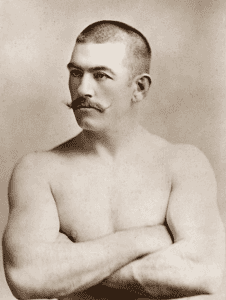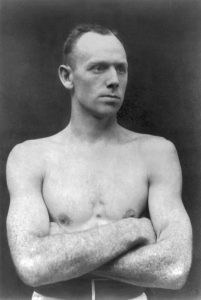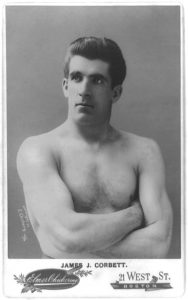Eye of the Tiger: Dan Deegan, Part 2
By Alice Askins, Education Coordinator at Rose Hill Mansion
Sporting events were Dan Deegan’s primary interest in life. His favorite sport was boxing. This story is a little complicated because in the 1890s and early 1900s, professional boxing was illegal in most states. Despite this, the newspapers openly reported on fights. It may have been that amateur bouts were legal. It is surprisingly hard to find specific information about the laws pertaining to the sport. New York State passed the Frawley Act in 1911 which permitted professional boxing until 1917 when a boxer was killed in the ring. The Walker Law passed in 1920, making bouts legal again. Still, for much of Deegan’s life, big-time boxing was against the law.

John Sullivan
By September 1893, shortly after he arrived in Geneva, the Daily Gazette reported: “Dan Deegan strung a special wire into his place, ‘The Store’ on Exchange street . . . over which to receive news from the Corbett-Mitchel fight. At first he had arranged to go down to Florida and see it, but so much uncertainty was thrown about the fight coming off that he gave it up.” Two days later, the Gazette reported that heavyweight champion John L. Sullivan had been in town for “a few hours.” Deegan had called on Sullivan during his visit, having “made the ex-champion’s acquaintance in his halcyon days.” Deegan “extended generous hospitality to the distinguished visitor which he duly appreciated.”
In March 1895, the Advertiser reported that Deegan was hustling to get his new restaurant (the Alhambra) ready for a visit by boxer James J. Corbett. Corbett was perhaps best known for having beaten Sullivan, but he also toured as an actor. He was performing in a play called Gentleman Jack (his nickname) at Geneva’s opera house. The Advertiser observed that though the plot was not deep the play was pleasing. “After the show was out Corbett and some of his men showed up at Dan Deegan’s new resort, and the rooms were packed . . . ” (April 2, 1895).
The Daily Times reported in December 1895 that “Dan Deegan, Edward Higgins and Michael Broderick returned last night from Syracuse, where they attended the Dunfee-Wood fight, which was stopped by the police.” The paper promoted a fight in Geneva the following month:
SPARRING TILT TO-NIGHT . . . in Dove’s Hall. The sparring match this evening . . . will be between James Walcott and George Dixon, both of Boston. . . . The game will probably be the sporting event of the season and a large attendance is expected. Reserve seat tickets on sale at Dan Deegan’s Alhambra Café. (January 9, 1896)
Perhaps “sparring” and “tilting” were words that signaled to the reader that the event was officially amateur, and the fights Deegan arranged may all have been in that category.
The Times mentioned Deegan again in November 1896:
FROM THE RING. Dan Deegan Has Arranged to Have the News by Wire. The Alhambra Café will have a wire direct to the ring side at Maspeth on Wednesday evening, and the fight between “Tommy” Ryan of Syracuse and “Mysterious Billy” Smith of Boston will be bulletined at the Alhambra . . . Mr. Deegan . . . has $500 ready to bet on his favorite “Tommy” Ryan, in the Ryan-Smith fight . . . Who will cover it[?]
Gambling, at least in the form of lotteries and casinos, was illegal in New York at this time, but personal bets must have been in a different category. They would have been impossible to regulate, certainly.
By February 1897, Deegan was selling tickets to a Syracuse fight. He had a diagram of the arena so you could choose your seat (Daily Times, February 19). A few days later, the Advertiser observed that “About sixty Genevans are going to Syracuse tomorrow to witness the athletic contests in the evening. Dan Deegan had about 100 tickets to dispose of, and all but about a dozen have been taken.”

Robert Fitzsimmons
Deegan was perfectly willing to travel further than Syracuse for a fight. He left in March 1897 for Carson City, Nevada, to see the Corbett-Fitzsimmons fight (Daily Times, March 10.) Professional boxing was legal in Nevada. The Advertiser thought he was probably the only Genevan to go, and assured readers that the trip “was as much for a change and a rest . . . as it was to see the fight. Yet it will be something for a sporting man to say hereafter that he was a witness of the greatest fight ever held” (March 16). After the fight Deegan extended his trip:
It seems that Dan Deegan joined that large party which left Carson City on the day after the fight, and went through to San Francisco, where he had a royal time for two or three days . . . he handsomely entertained Corbett when he was here two years ago, and the latter seldom forgets a courtesy of that nature. (Advertiser, March 23, 1897).
On his return to Geneva, Deegan had a few thoughts about the fight itself. Daily Times, April 5, 1897:
AN ACCIDENT . . .
Dan Deegan . . . has returned . . . His only regret on the journey was that he was entirely among strangers and that Corbett lost. It is understood that Deegan had $5,000 posted on the ex-champion and his regrets are very excusable. ‘Jim’ and ‘Dan’ are old friends . . . when it became known that [Deegan] was in Geneva . . . the Alhambra was soon crowded with a stream of callers . . . [wanting to hear] the story of the battle from the lips of a man who witnessed the event. There were college students in the throng, professional and business men, politicians and everyone that had a drop of sporting blood in his veins. Deegan tells the story . . . more graphically than it has yet appeared in a newspaper. . . . ‘It looked all for Corbett up to that decisive blow in the fourteenth round. . . . Corbett smiled all through, and ‘Fitz’ was covered with blood . . . When the accident occurred in the fourteenth – I call it an accident, for Jim had Bob almost whipped at the time – the boys could hardly realize that Jim was counted out . . . Corbett is still my favorite . . . and I believe him to be the better man . . . I am inclined to the belief that Corbett was over trained a little. I think that the twelve to fifteen mile runs a day weakened him very much.’
Around 1910, when movies had started making the rounds, there was discussion over whether films of boxing should be allowed:
The ground upon which [Geneva Mayor Patrick O’Malley] takes exception to the fight pictures is that such exhibitions tend to promote criminality by fostering and encouraging a fighting lust among the young people who flock to the moving picture shows.
The Mayor took this stand after he had been appealed to by Miss Anne F. Miller, the president of the Geneva Political Equality Club, who called the Mayor’s attention to the action taken in this matter by various other cities. . . . With a view of securing [public] support Miss Miller has addressed the following communication to The Times:
“Mayor O’Malley is determined that Geneva shall be free from the debasing influence of the moving pictures of the recent brutal combat at Reno. His task in barring them from the city will be made easier by the support of right minded citizens . . . “
In response to Mayor O’Malley’s objections to the moving pictures of the Johnson-Jeffries fight, Manager Daniel Deegan of the Dreamland Theater has declined to accept a contract for their use in his house (Daily Times July 7, 1910).
It seems unlikely that Deegan would have agreed with Miss Miller’s assessment of boxing, but he must have thought this was the prudent course to take.
Deegan was affiliated with the Geneva Athletic Club, and even after professional boxing was made temporarily legal by the Frawley law, Deegan continued to arrange apparent amateur bouts for the club. Of one such event, in March 1912, the Advertiser-Gazette said “Points, and not brutality count . . . in these contests, the true sportsmen’s tests. And Dan Deegan who conducts them, is a true sport in every sense of the term.”
Late in 1917, the Daily Times pointed out that the Frawley Law was about to expire. Deegan was to be the matchmaker for “one more card” at the Elks’ Club. After the Frawley Act ended on November 15, “it is questioned whether even the so-called club bouts will be legal” (November 10). “Nearly all of the larger cities are indulging in a last boxing card . . . “ (November 14) The show, incidentally, included “vodvil” acts between the fights, “and the Hobart Banjo Club and Male Quartette will give some jazzy harmony.”
Boxing, though, did not end in 1917. The Daily Times reported in 1919 that “Matchmaker Dan Deegan . . . last night signed the last match for the . . . next show . . . which will be staged at the Smith . . . it looks as if the Geneva fans . . . were to have the benefit of a few personal grudges” (September 24). The paper claimed the next month that Deegan considered handling boxers “a Rare and Delightful Pleasure,” but the article following actually featured Dan complaining about the difficulties of putting together a match, and saying that boxers are harder to please than horse racing men and actors (October 4).

James Corbett
Deegan retained his old enthusiasm, though, and in 1921 the Times reported him (and many other Genevans) going to Jersey City for the Jack Dempsey-Georges Carpentier fight (June 30). By this time, professional boxing was again legal, and the sport had gained a regulatory commission. Deegan arranged more matches in 1927 (Daily Times, October 26) and was promoting an amateur boxing club in Geneva in 1929 (Times, November 6). The bouts were still taking place at Smith Opera House. The year before he died, Dan was keeping time in a series of local fights (Times, December 28, 1933). In January 1935, James Corbett’s autobiography was given to the Library in Deegan’s memory.
Previous: A Genial, Good Hearted Man
Next: A man of incredible energy
